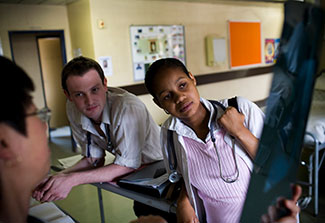Focus on NCDs: Training African scientists to fight NCDs in Africa
November / December 2017 | Volume 16, Issue 6

Photo by David Rochkind for Fogarty/NIH
Most graduates of the Wits research training program
remain in Africa after completing their studies.
By Karin Zeitvogel
When the University of the Witwatersrand (Wits) in Johannesburg set up its NCD Research Leadership program, supported by Fogarty's Chronic, Noncommunicable Diseases and Disorders Across the Lifespan (NCD-Lifespan), it encouraged trainees from around Africa to focus their research on the overlap of noncommunicable and infectious diseases. The trainees' projects covered multiple disciplines - public health, epidemiology, the economic evaluation of what is cost-effective and genetics - and they studied everything from stroke to chronic kidney disease, obesity and the reasons people seek medical care.
Dr. Soter Ameh of Nigeria focused on the latter. As part of his Ph.D. research at Wits, Ameh wanted to find out what causes older South Africans living in a rural community to go to the doctor. A questionnaire compiled by Ameh and put to nearly 6,000 people over age 50 showed that while both infectious and noncommunicable chronic diseases were highly prevalent in the community, people with long-term communicable diseases were more likely to seek treatment than those with NCDs. This could be because they were already getting HIV care through the system, and also because awareness of hypertension, the most prevalent NCD in the rural community, is low, Ameh said.
"The public needs to be educated about noncommunicable diseases, and the health care system adapted to prioritize care for all chronic illnesses among the older population," Ameh concluded. "My Fogarty-supported training at Wits has put me in a position to conduct research to address this challenge."
The Wits program has also allowed a dozen master's and Ph.D. candidates to complete post-graduate degrees without leaving Africa. Most graduates of the program remain in Africa after completing their studies and build local capacity, said Dr. Michèle Ramsay, one of four NCD-Lifespan program leaders at Wits.
"Fogarty, with its mission to uplift science internationally, has a true impact on researchers in low- to middle-income countries, who often struggle to get funding to move forward in their careers," Ramsay said. "Our program helps trainees find positions in their line of specialization, in their country of origin. And that, to me, is a measure of success."
More Information
To view Adobe PDF files,
download current, free accessible plug-ins from Adobe's website.